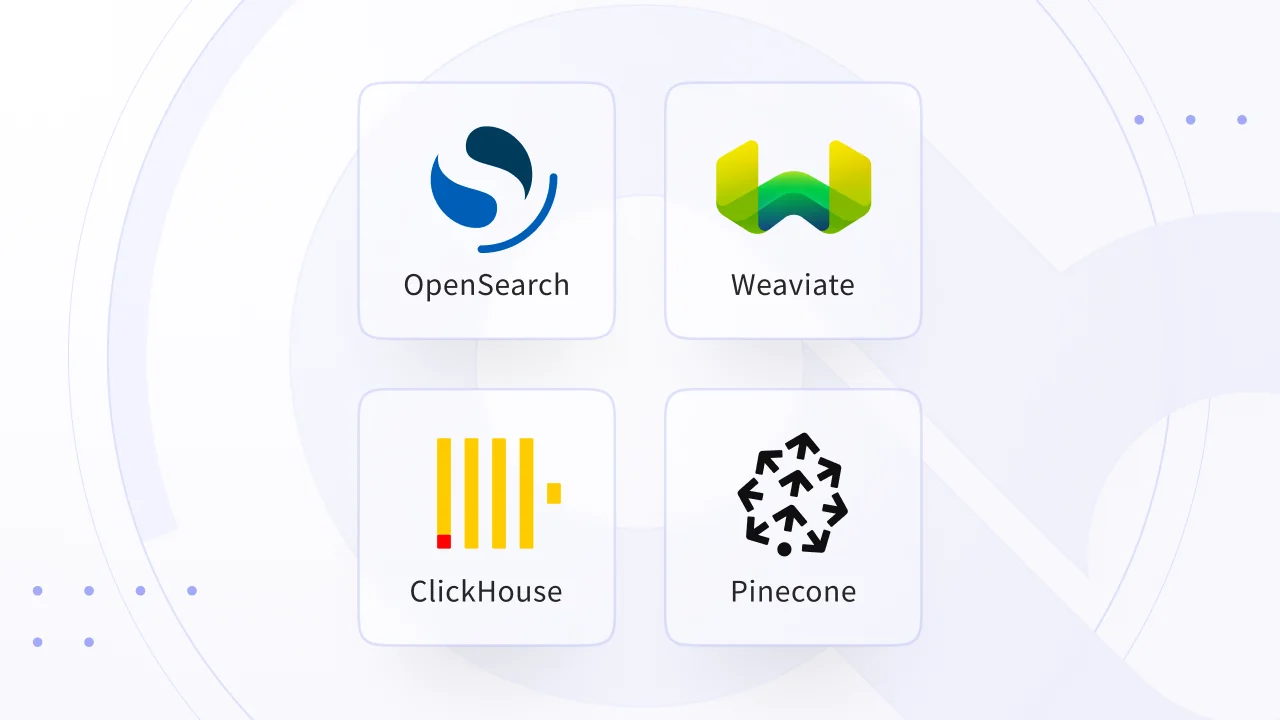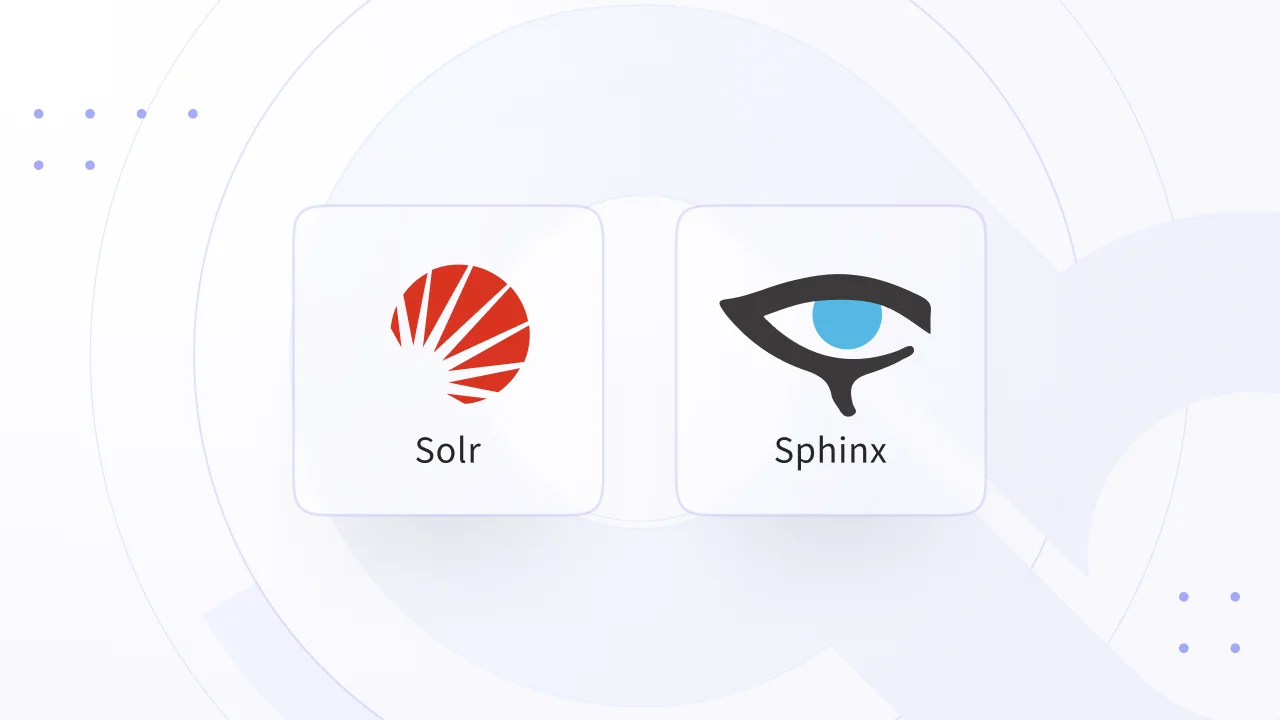A question we often get is what are good Elasticsearch alternatives. As you'd expect, it depends. In this post we'll go through some of the alternatives to Elasticsearch for various use-cases.
As the digital landscape continues to evolve, businesses are seeking powerful search engines and analytics tools to enhance their data management capabilities. In that ecosystem, Elasticsearch needs no introduction. It has long been a go-to solution for many analytics use-cases; however, recent changes in its licensing model and limitations in functionality have sparked a growing interest in viable alternatives. Some technologies are better options for some use-cases.
This comprehensive guide will take you on a journey through the world of Elasticsearch alternatives, highlighting their strengths, weaknesses, and suitability for various applications.
In this post, we will:
- Explore alternatives to Elasticsearch for cost-efficiency, scalability and ease of use for some use-cases.
- Compare some open source options as well as commercial and managed solutions.
- Evaluate AI powered solutions, hybrid search and vector database software.
Exploring Elasticsearch Alternatives
Elasticsearch is the de-facto standard for enterprise search, various text search use-cases such as ecommerce catalog search, wikis, and more. Lately, it is also being widely used as a vector database enabling vector search and hybrid search. And of course - log analytics and BI use-cases.
Finding the right alternative depends on the use-case Elasticsearch is serving. Several other search engine options exist, as well as analytical databases, catering to diverse business needs and offering a myriad of features to suit various applications. Some popular alternatives include:
- OpenSearch: An open-source search and analytics engine derived from Elasticsearch and developed by AWS.
- ClickHouse: A columnar database management system that can be used as a search engine for real-time analytics.
- Logz.io: A managed log analytics platform that offers powerful search capabilities and integrates with various data sources.
- Coralogix: A log management and analytics platform that provides advanced search functionality and real-time insights.
- Pinecone: Managed vector database for vector search, where vectors are first-class citizens.
- Weaviate: Open-source vector database, supporting full-text search queries and hybrid search.
Depending on whether your use-case is enterprise search, vector and hybrid search, log analytics or business intelligence tools - there are several alternatives to Elasticsearch some of which will be much more efficient and cost-effective.

OpenSearch: A Cost-Efficient Fork of Elasticsearch
Born from the community’s desire for an open-source alternative to Elasticsearch, OpenSearch is an efficient search and analytics suite that can be deployed on a standalone server or in a distributed environment. It is a fork of Elasticsearch, hence also based on the Lucene library, and provides the same set of features essentially.
Choosing OpenSearch allows businesses to reap the benefits of Elasticsearch without the significant cost of licensing for some features. Both self-managed and cloud-managed options are available to run OpenSearch.
We have also written a thorough OpenSearch vs Elasticsearch comparison in this blog. And if you're interested in managed services, check out our Elastic Cloud vs AWS Opensearch comprison.
ClickHouse: Optimal for Time Series Data and Heavy Aggregations
For businesses dealing with time series data, heavy aggregations, or long retention periods, ClickHouse is an excellent choice. This open-source column-oriented database management system is designed for online analytical processing (OLAP), offering real-time analytical data reports using SQL queries and supporting various data types.
ClickHouse, with its remarkable performance and cost-effectiveness, is ideally suited for applications requiring long-term data storage and intricate operations.
For any analytics use-case, ClickHouse will be a faster and more economic choice. However, it currently does not support text search at all.
Managed Tools for Log Analytics: Logz.io and Coralogix
Logz.io and Coralogix are popular managed tools for log analytics, providing comprehensive solutions with reduced overhead. Built on ELK (Elasticsearch, Logstash, and Kibana) and Grafana, Logz.io is a scalable and intelligent machine data analytics platform that can act as a storage engine for log data. While offering a more straightforward approach to adopting and scaling open source observability tools, these managed solutions may come at a higher cost compared to other alternatives.
Coralogix takes a different approach, by analyzing the stream of logs on the fly instead of indexing them, and significantly reducing required storage space and costs.
These solutions are more suitable for the log analytics use-case - if you are looking for centralized logs solution, with more advanced features, and without deploying and maintaining the software yourself, they are both good solutions.
Legacy Open Source Search Engines
Other open source search engine options exist, but the ones listed in this section we consider to be legacy options and not really alternatives or competitors to Elasticsearch.
Solr is another robust open source search engine with strong community support, based on Lucene too. Its supported platform and vigorous community have kept Solr relevant in the search engine landscape. Despite its robustness, scaling up search operations with Solr can be complex, and developers experience (API) is significantly more challenging, thus we usually do not recommend Solr as an alternative.
Sphinx is an open-source SQL search engine renowned for its superior performance in full-text indexing and searching, providing quick search results for users. It was a very popular choice in the past, but has seen significant decline in adoption and users in the recent years.

Evaluating Cloud-Based and AI-Powered Search Solutions
In recent years, the search engine market has seen the rise of cloud-based and AI-powered solutions, offering businesses a new approach to data management and search analytics. These innovative platforms provide benefits such as scalability, cost-efficiency, and user-friendliness while ensuring seamless site connection and integration with existing infrastructure. However, these solutions may come with some drawbacks, including limited control over the data, potential security issues, and a lack of customization options.
AI-powered search solutions, like Algolia, Vespa, Pinecone and others, leverage machine learning algorithms to offer more precise and relevant search results. While these solutions provide enhanced accuracy, relevance, and speed, they may also come with a higher implementation cost and require specialized knowledge. Identifying the best fit for your business involves comparing each solution’s pros and cons against your distinct needs and objectives.
Modern search platforms are now powered by ML, where Machine Learning models optimize search and data is represented as vectors to capture more semantic meanings. Elasticsearch is definitely in the Vector DB category, and in some cases other vector databases can be considered as alternatives.

Algolia: AI-Powered Search for E-Commerce
Algolia is an AI-powered search and discovery platform that has gained popularity among software engineers and e-commerce businesses. Its API offers powerful capabilities for app developers and companies. They can create their own search experiences for users..
Being a cloud-based Software as a Service (SaaS), Algolia delivers high-speed search performance, with pricing based on the count of records and operations.
Vespa: High-Performance Search by Yahoo
Developed by Yahoo, Vespa is a high-performance and scalable search platform optimized for large datasets and AI-powered data science. It boasts an array of AI-powered capabilities such as natural language processing, machine learning, and deep learning, allowing users to quickly and accurately analyze large datasets and uncover valuable insights.
Vespa’s efficiency and advanced features make it a worthy contender in the search engine market. However, it's API is harder to use and less developer friendly as others'.
Pinecone: Cloud-native Vector Database
Pinecone is a fully managed solution that focuses on providing fast and accurate similarity search by making vectors first-class citizens.
It is designed to handle high-dimensional vector data efficiently, making it an excellent choice for applications such as recommendation systems, content similarity matching, and anomaly detection. Pinecone offers a simple and intuitive API, allowing developers to easily index and search vectors without worrying about the underlying infrastructure. With its emphasis on performance and scalability, Pinecone is well-suited for real-time applications that require fast and accurate similarity search.
Weaviate: Open Source Vector Database
Weaviate, on the other hand, is an open-source knowledge graph that incorporates vector search capabilities. It is designed to store and search complex, heterogeneous data by representing entities and their relationships as vectors.
While Weaviate's vector search capabilities are not as specialized as Pinecone's, it offers a broader set of functionalities for building knowledge graphs and conducting complex queries. Weaviate is a more versatile knowledge graph with vector search capabilities, and is suitable for installations also as self-managed.
Typesense: Fast Enterprise Search with Enhanced Accuracy
Typesense is a cloud-based search platform that offers typo tolerance, filtering, and faceted search for enhanced accuracy and relevance in enterprise search. Its modern, privacy-oriented, open-source design is optimized for performance and usability, making it a popular choice for businesses seeking fast and secure search solutions.
Typesense, with its advanced features and user-friendly interface, is apt for a wide variety of applications, ranging from e-commerce to customer service and knowledge management.
Do You Need a Search Engine?
The only drop-in alternatives to Elasticsearch is OpenSearch, as in it's core it's essentially the same software with some mild differences. Usually the driver for this switch will be licensing and cost, or a choice of a manged solution provider.
If you need a search engine, whether for text search or Machine Learning based search and hybrid search - OpenSearch is most likely your best option, with Pinecone, Weaviate and Vespa being valid options as well.
If you prefer more generic, cloud-native solutions - Algolia might be a good fit. It does not require learning an API and deploying any software, and offers out-of-the-box experience for catalog and website search.
However, many Elasticsearch users do not even require search capabilities, but use Elasticsearch for analytics. In that case, ClickHouse (self-managed or cloud-hosted) and fully managed products like Coralogix and Logz.io are absolutely a good option, especially when it comes to log analytics.
Is Elasticsearch still relevant?
Elasticsearch has been a popular choice for search engine, log analytics and business analytics since 2010 and has solidified its position in the market with simple scalability and better integration with other products.
For some use-cases, other technologies might work better, or be a better fit overall, but not without a learning curve. Elasticsearch and the Elastic Stack have been around for over a decade now, and are well-known technologies. Elasticsearch is still the go-to solution for many and will remain so for a long while; and it's still easier to use by far compared to some of the alternatives.
In conclusion, the search for the perfect Elasticsearch alternative is an exercise in understanding your business needs and the diverse landscape of search engines available. Whether you’re considering open-source search engines like OpenSearch, Solr, and Sphinx, managed log analytics tools like Logz.io and Corralogix, or cloud-based and AI-powered platforms such as Algolia and Pinecone, it’s vital to weigh the pros and cons of each option against your specific requirements. By making an informed decision, you can unlock the full potential of your data and drive your business towards success.





